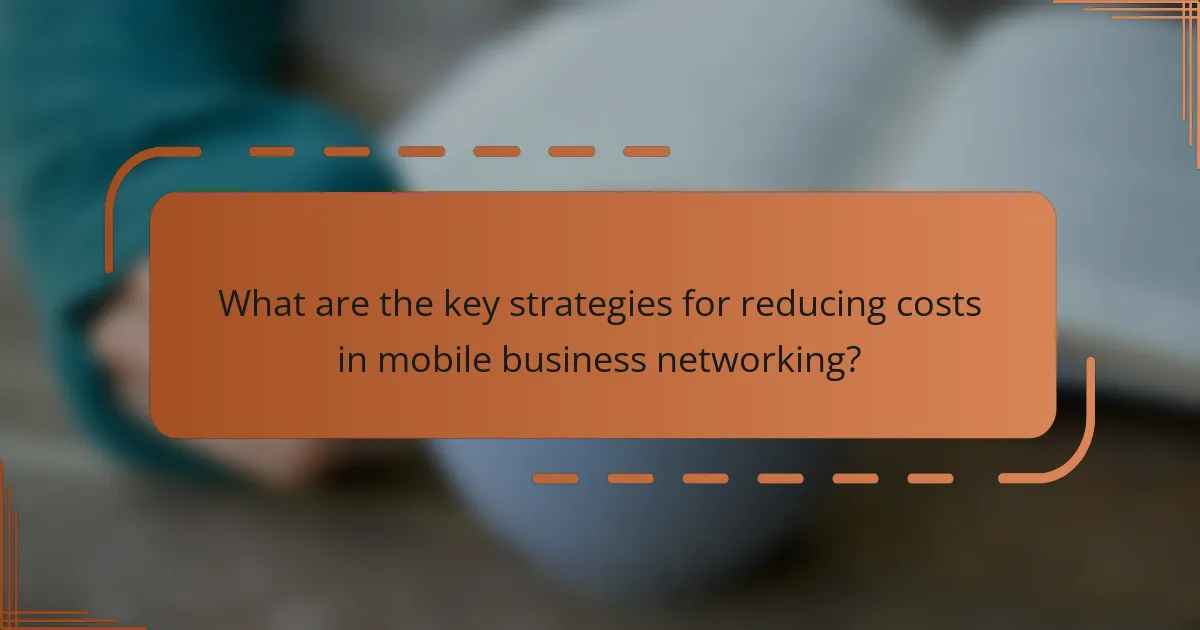The article focuses on strategies for reducing costs in mobile business networking, emphasizing three key areas: vendor selection, contract negotiation, and technology utilization. It outlines the importance of optimizing vendor selection by evaluating multiple providers to secure competitive pricing and tailored services. Additionally, effective negotiation techniques are highlighted as a means to achieve favorable contract terms, discounts, and lower fees. Finally, the article discusses how leveraging technology, such as cloud services and mobile applications, can enhance operational efficiency and reduce overhead costs, ultimately leading to significant savings for businesses.

What are the key strategies for reducing costs in mobile business networking?
Key strategies for reducing costs in mobile business networking include optimizing vendor selection, negotiating contracts effectively, and utilizing technology wisely. Optimizing vendor selection involves assessing multiple providers to find competitive pricing and services that meet specific needs. Effective negotiation of contracts can lead to better terms, discounts, and reduced fees. Utilizing technology, such as cloud services and mobile applications, can streamline operations and lower overhead costs. Implementing these strategies can result in significant cost savings for businesses.
How can negotiation techniques impact cost reduction?
Negotiation techniques can significantly impact cost reduction by enabling businesses to secure better terms and prices. Effective negotiation fosters a collaborative environment, encouraging vendors to offer discounts or improved pricing structures. Techniques such as leveraging competitive bids can create pressure on suppliers to lower costs. Additionally, establishing long-term relationships with vendors can lead to more favorable pricing over time. Research shows that companies employing structured negotiation strategies often achieve cost savings of 10% to 30%. These savings arise from improved contract terms and reduced procurement costs.
What are effective negotiation tactics for mobile business networking?
Effective negotiation tactics for mobile business networking include active listening, clear communication, and building rapport. Active listening ensures understanding of the other party’s needs. Clear communication helps articulate your own objectives and constraints. Building rapport fosters trust and collaboration, which can lead to more favorable outcomes. Additionally, leveraging data and analytics can strengthen your position by providing concrete evidence to support your arguments. Research shows that effective negotiators often prepare thoroughly by understanding market trends and competitor offerings. This preparation allows for informed discussions. Lastly, being flexible and open to alternative solutions can create win-win scenarios that benefit both parties involved.
How can understanding vendor psychology enhance negotiation outcomes?
Understanding vendor psychology can significantly enhance negotiation outcomes. By recognizing the motivations and decision-making processes of vendors, negotiators can tailor their strategies effectively. Vendors often prioritize relationship-building and trust. Acknowledging these factors can lead to more collaborative negotiations. Effective communication that resonates with vendors’ values can foster goodwill. Research indicates that emotional intelligence plays a crucial role in successful negotiations. According to a study published in the Journal of Business Research, negotiators who understand psychological dynamics achieve better results. Therefore, leveraging insights into vendor psychology can lead to improved agreements and cost reductions.
What role does vendor selection play in cost management?
Vendor selection is critical in cost management as it directly influences pricing, quality, and service levels. Choosing the right vendor can lead to significant cost savings. Effective vendor selection ensures competitive pricing through negotiations and comparisons. It also impacts the quality of goods and services, which can affect overall expenses. A vendor with a better reputation may offer more reliable products, reducing maintenance and replacement costs. Furthermore, strategic vendor relationships can lead to favorable payment terms, enhancing cash flow management. According to a study by the Institute for Supply Management, organizations that prioritize vendor selection can reduce costs by up to 20%. Thus, careful vendor selection plays a pivotal role in optimizing cost management strategies.
What criteria should be used for selecting vendors in mobile business networking?
The criteria for selecting vendors in mobile business networking include reliability, cost-effectiveness, and technological compatibility. Reliability ensures that vendors can consistently deliver services without interruptions. Cost-effectiveness evaluates whether the vendor’s pricing aligns with budget constraints while providing value. Technological compatibility assesses if the vendor’s solutions integrate seamlessly with existing systems. Additionally, vendor reputation and customer support are critical factors. A strong reputation indicates trustworthiness and quality. Effective customer support ensures assistance is available when needed. These criteria help organizations choose the best vendors for successful mobile business networking.
How can comparing vendor proposals lead to cost savings?
Comparing vendor proposals can lead to cost savings by identifying the most competitive pricing and value offerings. This process allows businesses to evaluate multiple options. It highlights discrepancies in pricing among vendors. Businesses can leverage this information during negotiations. By understanding the market rates, organizations can secure better deals. Additionally, comparing proposals reveals varying service levels and features. This enables informed decisions based on overall value, not just cost. Ultimately, this strategic approach can lead to significant financial savings.
How does contract management contribute to reduced expenses?
Contract management contributes to reduced expenses by optimizing vendor agreements and ensuring compliance. Effective contract management minimizes the risk of costly disputes and penalties. It facilitates better negotiation outcomes, leading to favorable terms and pricing. Streamlined processes reduce administrative costs associated with contract execution. Regular reviews of contract performance can identify savings opportunities. Additionally, it helps in maintaining accurate records, which prevents overpayments. According to a study by the International Association for Contract and Commercial Management, organizations that implement robust contract management practices can reduce costs by up to 30%.
What are the essential elements of a cost-effective contract?
The essential elements of a cost-effective contract include clear terms, defined scope, and performance metrics. Clear terms prevent misunderstandings and outline responsibilities. A defined scope specifies the work to be completed, reducing ambiguity. Performance metrics establish benchmarks for evaluating success. Cost structures should also be transparent to avoid hidden fees. Flexibility in terms allows for adjustments as needed. Legal compliance ensures the contract adheres to applicable laws. Finally, a well-defined dispute resolution process can minimize costs related to conflicts. These elements collectively contribute to a contract that effectively manages costs while meeting business objectives.
How can ongoing contract evaluation help in maintaining low costs?
Ongoing contract evaluation helps maintain low costs by identifying inefficiencies and opportunities for cost reduction. Regular assessments allow businesses to compare current contract terms with market conditions. This can reveal areas where negotiation for better pricing or terms is possible. For instance, suppliers may offer discounts for long-term commitments or bulk purchases. Additionally, ongoing evaluations can highlight underperforming vendors, enabling businesses to switch to more cost-effective alternatives. According to a study by the Institute for Supply Management, companies that regularly evaluate contracts reduce costs by an average of 10-15%. This proactive approach ensures that businesses are not locked into unfavorable terms, ultimately supporting sustained cost management.
What transitional strategies can link negotiations and vendor selection?
Transitional strategies that link negotiations and vendor selection include establishing clear criteria for vendor evaluation. This involves defining specific requirements that vendors must meet during negotiations. Effective communication of these criteria during discussions helps align expectations. Additionally, creating a structured negotiation framework facilitates consistent assessment of vendor proposals. Utilizing decision matrices can aid in comparing vendor offerings systematically. Engaging stakeholders throughout the negotiation process ensures that all relevant perspectives are considered. Finally, documenting negotiation outcomes and vendor performance allows for informed future selections. These strategies collectively enhance the alignment between negotiations and vendor selection.
How can effective communication improve vendor relationships?
Effective communication can significantly improve vendor relationships by fostering trust and transparency. Clear communication ensures that both parties understand expectations and requirements. This reduces misunderstandings and errors in the supply chain. Regular updates and feedback can enhance collaboration and problem-solving. Studies show that companies with strong communication practices experience 25% higher productivity. Additionally, effective communication can lead to better negotiation outcomes, as both sides feel heard and valued. This ultimately contributes to long-term partnerships and improved business performance.
What specific techniques can optimize vendor negotiations?
Establishing clear objectives is crucial for optimizing vendor negotiations. This technique ensures that both parties understand their goals and limits. Conducting thorough market research allows negotiators to know current pricing and industry standards. This information can empower negotiators to make informed offers and counteroffers. Building strong relationships with vendors fosters trust and can lead to better terms. Effective communication is vital in expressing needs and expectations clearly. Utilizing competitive bidding can create leverage by encouraging vendors to offer their best prices. Lastly, being prepared to walk away provides a strong negotiating position. Each of these techniques contributes to achieving favorable outcomes in vendor negotiations.
How can leveraging market research strengthen negotiation positions?
Leveraging market research strengthens negotiation positions by providing data-driven insights. This knowledge allows negotiators to understand industry standards and competitor pricing. It helps identify the best alternatives available in the market. Informed negotiators can set realistic expectations and goals. They can also anticipate the other party’s needs and objections. Research reveals trends that can influence negotiation strategies. For instance, understanding consumer demand can lead to better pricing strategies. Accurate market data enhances confidence and credibility during discussions.
What are some common pitfalls in vendor negotiation to avoid?
Common pitfalls in vendor negotiation include lack of preparation, poor communication, and not understanding the vendor’s perspective. Lack of preparation can lead to missed opportunities for better terms. Poor communication may result in misunderstandings and conflicts. Not understanding the vendor’s perspective can hinder relationship building. Additionally, failing to establish clear objectives can lead to ineffective negotiations. Overlooking the importance of flexibility may also restrict potential benefits. Lastly, neglecting to consider total cost of ownership can result in unanticipated expenses. These pitfalls can significantly impact negotiation outcomes and overall vendor relationships.
What best practices should be followed in contract management?
Best practices in contract management include maintaining clear communication, ensuring compliance, and regularly reviewing contracts. Clear communication helps all parties understand their obligations. Compliance with legal and regulatory requirements prevents disputes. Regular reviews identify opportunities for renegotiation or termination. Additionally, utilizing contract management software enhances tracking and organization. Training staff on contract management processes improves efficiency. Establishing performance metrics ensures accountability. Documenting changes and amendments maintains a clear contract history. These practices contribute to effective contract management and cost reduction.
How can technology streamline contract management processes?
Technology can streamline contract management processes by automating key tasks and improving accessibility. Automation reduces manual entry errors and saves time in contract creation and approval. Digital storage allows for easy retrieval and sharing of contracts across teams. Advanced analytics can track contract performance and compliance, identifying potential risks. E-signature solutions expedite the signing process, reducing delays. Integration with other business systems enhances data accuracy and workflow efficiency. According to a study by the International Association for Contract & Commercial Management, organizations using contract management technology report a 25% reduction in contract cycle times.
What are the key performance indicators for monitoring contract effectiveness?
Key performance indicators for monitoring contract effectiveness include compliance rate, cost savings, and performance metrics. Compliance rate measures adherence to contract terms and conditions. Cost savings evaluate financial benefits achieved through the contract. Performance metrics assess the quality and timeliness of deliverables. Other indicators include customer satisfaction, risk management effectiveness, and change order frequency. These metrics provide a comprehensive view of contract performance. Tracking these indicators helps organizations optimize contract management and ensure value delivery.
What actionable tips can businesses implement to reduce costs in mobile networking?
Businesses can reduce costs in mobile networking by optimizing their data plans. Analyzing usage patterns helps identify unnecessary expenses. Switching to a more cost-effective provider can yield significant savings. Implementing mobile device management (MDM) solutions reduces security risks and associated costs. Encouraging employees to use Wi-Fi whenever possible minimizes cellular data usage. Negotiating contracts with vendors can lead to better rates and terms. Regularly reviewing and adjusting plans based on current needs prevents overpayment. Lastly, investing in training for staff on efficient mobile usage can enhance productivity and reduce costs.
The main entity of the article is cost reduction strategies in mobile business networking. The article outlines key strategies including optimizing vendor selection, effective negotiation techniques, and robust contract management to achieve significant cost savings. It details how these strategies can enhance vendor relationships, improve negotiation outcomes, and streamline contract processes, ultimately leading to better pricing and reduced expenses. Furthermore, it emphasizes the importance of ongoing evaluations and the use of technology in managing contracts effectively to support sustained cost management.


